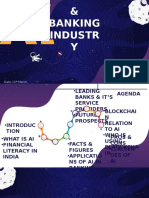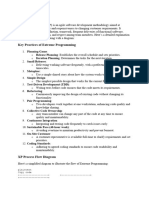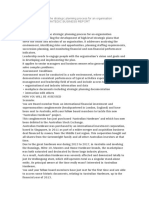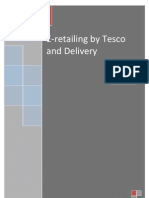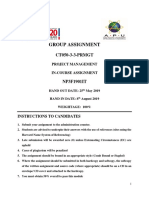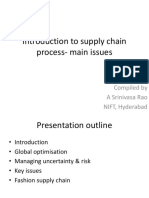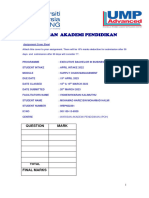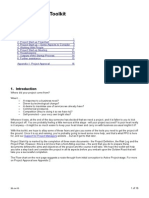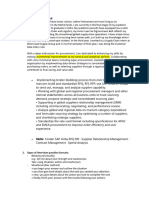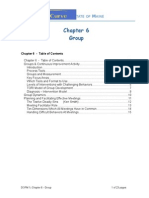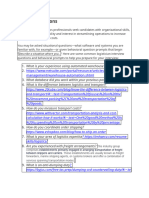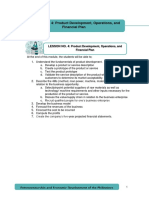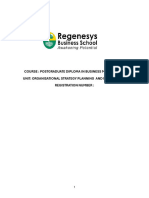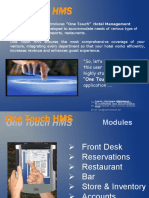Supply Chain Management Certification: Through Learning
Supply Chain Management Certification: Through Learning
Uploaded by
Rahul SodalCopyright:
Available Formats
Supply Chain Management Certification: Through Learning
Supply Chain Management Certification: Through Learning
Uploaded by
Rahul SodalOriginal Description:
Original Title
Copyright
Available Formats
Share this document
Did you find this document useful?
Is this content inappropriate?
Copyright:
Available Formats
Supply Chain Management Certification: Through Learning
Supply Chain Management Certification: Through Learning
Uploaded by
Rahul SodalCopyright:
Available Formats
Real Results through Learning
CERTIFICATION PROGRAMMES
PHASE 1: JAN 6 - 11, 2014 PHASE 2: APR 14 - 18, 2014
SUPPLY CHAIN MANAGEMENT
CERTIFICATION
Encourage best practices in supply chain
management through education
Supply Chain Management Certification
Competitiveness of the manufacturing enterprises can be increased
by re-engineering their supply chains. An increasing proportion of value
is added outside the organisation. Your success depends not only on what
happens within your organisational boundaries, but also on your suppliers
and downstream partners. The real competition is not between firms,
but between supply chains.
This certificate programme consists of training in the tools of Global
Supply Chain Management that teaches concepts, tools and applications
and involves completion of a project within the company. The unified use
of basic and advanced concepts for designing and improving supply chains,
ISBs academic environment, well researched pedagogies and highly
acclaimed faculty will be the distinguishing features.
The key differentiators of this programme are as follows:
Group Effort. Each firm will send three to four participants, potentially
from different functions that affect supply chain performance.
Theory and Practice. Participants learn intensively during the
Residency Phase at ISB then apply that knowledge during Project Phase
within their organisation.
Continuity over Time. Organisations can send a different team of
managers over the years so that the next level of problem is addressed.
Cross Learning. The Presentation Phase enables inter-firm learning.
Certification. Successful completion of three phases will lead
to a certification for participants indicating proficiency and expertise
in pursuing supply chain excellence.
Evaluation on the process
followed by participants on an
individual basis for the project
work will be done to ensure
importance is given to both
the end result as well as the
path adopted.
+ + + + + + + + + + + + + + + + + + + + + + + + + + + + + +
+ + + + + + + + + + + + + + + + + + + + + + + + + + + + + +
+ + + + + + + + + + + + + + + + + + + + + + + + + + + + + +
+ + + + + + + + + + + + + + + + + + + + + + + + + + + + + +
+ + + + + + + + + + + + + + + + + + + + + + + + + + + + + +
+ + + + + + + + + + + + + + + + + + + + + + + + + + + + + +
+ + + + + + + + + + + + + + + + + + + + + + + + + + + + + +
+ + + + + + + + + + + + + + + + + + + + + + + + + + + + + +
+ + + + + + + + + + + + + + + + + + + + + + + + + + + + + +
+ + + + + + + + + + + + + + + + + + + + + + + + + + + + + +
+ + + + + + + + + + + + + + + + + + + + + + + + + + + + + +
+ + + + + + + + + + + + + + + + + + + + + + + + + + + + + +
+ + + + + + + + + + + + + + + + + + + + + + + + + + + + + +
+ + + + + + + + + + + + + + + + + + + + + + + + + + + + + +
+ + + + + + + + + + + + + + + + + + + + + + + + + + + + + +
+ + + + + + + + + + + + + + + + + + + + + + + + + + + + + +
+ + + + + + + + + + + + + + + + + + + + + + + + + + + + + +
Programme content
Phase 1 will cover the basic issues of supply
chain management, design, and analytical
techniques used to evaluate supply chain
outcomes. This module will be case based
and cover examples from a wide variety
of manufacturing and service industries. Some
of the issues covered in this module include:
1. Why aligning your supply chain strategy
to the overall business strategy is necessary?
2. How should managers think about
designing their supply chain strategy to get
such an alignment?
3. What managerial levers are available
to achieve desired outcomes?
4. Managerial issues in designing and
managing the four fundamental supply
chain levers: facilities (networks),
inventory, information, and transportation.
Discussion will include several topics
related to:
a. Valuing the role of capacity (flexible
and dedicated) when faced with macro-
economic uncertainty.
b. How to manage inventory in a supply
chain efficiently (cycle inventory as
well as safety inventory).
c. The role of information in a supply
chain, how and why does information
distortion happen, and the significant
consequences for supply chains.
d. How to design and manage logistics
networks.
e. Issues related to the design supply chain
contracts, incentives, outsourcing,
mass customisation, product and
process design to achieve efficiency
and responsiveness, and quick
and accurate response.
The second part of the first module covers
issues related to managing product and service
design and how these two key activities both
constrain and complement earlier topics
related to supply chain strategy. Topics covered
will include:
1. How does the design of your product/
service affect the supply chain needed
to deliver the product/service?
2. How does the fit between product/
service and supply chain affect the firms
broader business performance? Subtopics:
design for manufacturing, design for
remanufacturing, design for logistics, etc.
3. When and how should you collaborate
with your suppliers at the design stage?
4. How can the collaboration process
be managed to gain faster development
cycles. What tools are available to plan
out collaborations?
5. When and how should you engage
in outsourced design and development?
6. How does outsourced design
and development affect your supply
chain strategy?
Project Phase
Immediately following the Residential
Phase, the Project Phase includes a live
project within your own organisation. This
three-month project will include fortnightly
interactions with the ISB faculty. Successful
project completion is necessary to receive
the certificate; Participants from the same
organisation should undertake the same project.
Phase 2 will primarily focus on learning from
how Toyota manages its supply chain. Toyota
is recognised world-wide for its operational
efficiency and excellence. This module is based
on book Toyota Supply Chain Management
by Ananth V. Iyer, Sridhar Seshadri, and Roy
Vasher. The module will reinforce the learning
from the first module by discussing the v4L
framework and why it is important. The
module will illustrate how the Toyota Supply
Chain Management principles and practices
can be used to resolve several problems within
a supply chain. Issues related to production
planning, scheduling, transportation network
design, information asymmetry and such will
be covered in this module by focusing on the
Toyota way.
Learning from Toyota SCM
1. The v4L principle and framework
2. Production planning, sequencing,
and scheduling (Heijunka)
3. Supplier selection & management
a. Inbound & outbound transportation
logistics
b. Dealer operations
c. Demand management
4. Global supply chains and creating
a learning organisation
a. Imbedding continuous learning
principles
b. How Toyota will play the beer game
5. Crisis management
6. Lean operations and its applications
to SCM
The project Presentation will review
critiques and ideas generated by you during
your project. This will follow discussions,
knowledge assimilation and individual
assessments that will help you execute
your ideas at work.
Programme Time-line
Residency Phase 1
Five Days at ISB
Project Phase
Three months
in respective
organisation
Residency Phase 2
Five Days at ISB
Certication
What you will gain
Participants/organisations attending
the programme will gain the following:
Team Building
Each organisation sends three to four
participants, potentially from different
functions that directly affect supply
chain performance.
Action Learning
The programme involves an intensive
classroom schedule at ISB followed by a live
project at participants organisations, allowing
them to apply their learning at work.
Continual Learning
Organisations can send a different team
of managers over the years, so business
problems continue to be addressed.
Cross-functional Learning
The live project involves members from
different functions in the organisation,
allowing participants to better appreciate
the workings within the set-up.
Industry Learning
The presence of teams from other
organisations gives participants an insiders
view of the industry.
Individual Evaluation
The performance of participants during the
project phase will be assessed on an individual
basis, with comprehensive feedback for every
stage of the project.
The programme will enable participants
to bring the challenges and opportunities
faced by the industry, in the form of case
studies, white papers, and benchmark data
set that can serve as a basis for future research
and education.
Participant profile
Mid-level managers with 8 to 12
years experience from manufacturing,
transportation and retail sectors. They can
be involved in new product development,
manufacturing, logistics, sales, accounting or
enterprise resource planning. The target exec
may or may not have an MBA. They must have
motivation and energy to bring and work
on a data-driven project from their company
that affects supply chain changes within
their organisation.
Projects from earlier programmes
Improving service level to the distributor
Risk mitigation for foreign procurement
Inventory reduction, management of depot
space, stock-out and write-offs
Reducing response time for order execution
Reduction of delivery slippage
Optimising secondary transportation
Reducing delivery time of products
Reducing packing inventory
+ + + + + + + + + + + + + + + + + + + + + + + + + + + + + +
+ + + + + + + + + + + + + + + + + + + + + + + + + + + + + +
+ + + + + + + + + + + + + + + + + + + + + + + + + + + + + +
+ + + + + + + + + + + + + + + + + + + + + + + + + + + + + +
+ + + + + + + + + + + + + + + + + + + + + + + + + + + + + +
+ + + + + + + + + + + + + + + + + + + + + + + + + + + + + +
+ + + + + + + + + + + + + + + + + + + + + + + + + + + + + +
+ + + + + + + + + + + + + + + + + + + + + + + + + + + + + +
+ + + + + + + + + + + + + + + + + + + + + + + + + + + + + +
+ + + + + + + + + + + + + + + + + + + + + + + + + + + + + +
+ + + + + + + + + + + + + + + + + + + + + + + + + + + + + +
+ + + + + + + + + + + + + + + + + + + + + + + + +
Other programmes recommended
Negotiation Strategies
Feb 11 - 12, 2014
How to apply
Download the application
form from www.isb.edu/cee/
apply and follow the mailing
instructions mentioned
therein (or)
Write to us at execed@isb.edu
for more details (or)
Call us on
+91 40 2300 7041/42
+ + + + + + + + + + + + + + + + + + + + + + + + +
+ + + + + + + + + + + + + + + + + + + + + + + + + + + + + + + + + + + + + + + + + + + + + + + + + +
Few Participating Organisations from Previous Years
Amazon
Mars India
SRF Ltd
Jones Lang Lasalle
Avenue super Mart
Manipal Hospitals
+ + + + + + + + + + + + + + + + + + + + + + + + + + + + + + + + + + + + + + + + + + + + + + + + + +
Programme fee
INR 2,25,000 + 50,000 project
fee (Up to 5 Participants per
organisation) plus tax
Fee includes food and accommodation
at the ISB campus or at an equivalent
facility based on availability.
Venue: ISB, Hyderabad Campus
Programme dates
Phase1: The programme
starts at 7.00 pm on Jan 6,
2014 and concludes at 5.00 pm
on Jan 11, 2014.
Phase 2: The programme
starts at 7.00 pm on Apr 14,
2014 and concludes at 5.00 pm
on Apr 18, 2014
A five day in residence exec
programme, followed by a
three month out of residence
programme within the company
(project work) with periodic
interactions, followed by another
five days in residence academic
sessions, project presentation
and certificate completion.
Total time from start to finish
is four months.
Faculty
Prof Sridhar Seshadri - Professor of Operations and
Management Science at Indian School of Business and Senior
Associate Dean, Faculty and Research. He teaches courses
like Logistics and Supply Chain Management, Operations
Strategy, Pricing and Revenue Optimisation, Operations
Management. His research interests include stochastic
modelling and applications in queuing systems, supply chain
management and revenue management.
Prof Milind Sohoni - Associate Professor of Operations
and Management Science at Indian School of Business. He
teaches courses like Decision Models and Optimisation,
Logistics and Supply Chain Management, Revenue
Management and Network Optimisation, Introduction
to Management Science. His research interests include
Information Sharing in Supply Chains, Supply Chain
Incentives, Capacity Allocation in Healthcare and
Pharmaceutical Industries , Network Design
and Scheduling.
Sanjiv Erat - Associate Professor of Operations
and Management Science at Indian School of Business.
He teaches courses like Operations Management, Managing
Product and Service development. His research interests
include Innovation Contests, Co-development processes;
Strategic drivers for collaborative product development,
Collaboration processes, Behavioural economics
+ + + + + + + + + + + + + + + + + + + + + + + + + + + + +
+ + + + + + + + + + + + + + + + + + + + + + + + + + + + +
+ + + + + + + + + + + + + + + + + + + + + + + + + + + + +
+ + + + + + + + + + + + + + + + + + + + + + + + + + + + +
+ + + + + + + + + + + + + + + + + + + + + + + + + + + + +
+ + + + + + + + + + + + + + + + + + + + + + + + + + + + +
+ + + + + + + + + + + + + + + + + + + + + + + + + + + + +
+ + + + + + + + + + + + + + + + + + + + + + + + + + + + +
+ + + + + + + + + + + + + + + + + + + + + + + + + + + + +
+ + + + + + + + + + + + + + + + + + + + + + + + + + + + +
+ + + + + + + + + + + + + + + + + + + + + + + + + + + + +
+ + + + + + + + + + + + + + + + + + + + + + + + + + + + +
+ + + + + + + + + + + + + + + + + + + + + + + + + + + + +
+ + + + + + + + + + + + + + + + + + + + + + + + + + + + +
+ + + + + + + + + + + + + + + + + + + + + + + + + + + + +
+ + + + + + + + + + + + + + + + + + + + + + + + + + + + +
+ + + + + + + + + + + + + + + + + + + + + + + + + + + + +
+ + + + + + + + + + + + + + + + + + + + + + + + + + + + +
+ + + + + + + + + + + + + + + + + + + + + + + + + + + + +
+ + + + + + + + + + + + + + + + + + + + + + + + + + + + +
+ + + + + + + + + + + + + + + + + + + + + + + + + + + + +
+ + + + + + + + + + + + + + + + + + + + + + + + + + + + +
+ + + + + + + + + + + + + + + + + + + + + + + + + + + + +
+ + + + + + + + + + + + + + + + + + + + + + + + + + + + +
+ + + + + + + + + + + + + + + + + + + + + + + + + + + + +
+ + + + + + + + + + + + + + + + + + + + + + + + + + + + +
+ + + + + + + + + + + + + + + + + + + + + + + + + + + + +
+ + + + + + + + + + + + + + + + + + + + + + + + + + + + +
+ + + + + + + + + + + + + + + + + + + + + + + + + + + + +
+ + + + + + + + + + + + + + + + + + + + + + + + + + + + +
+ + + + + + + + + + + + + + + + + + + + + + + + + + + + +
+ + + + + + + + + + + + + + + + + + + + + + + + + + + + +
+ + + + + + + + + + + + + + + + + + + + + + + + + + + + +
+ + + + + + + + + + + + + + + + + + + + + + + + + + + + +
+ + + + + + + + + + + + + + + + + + + + + + + + + + + + +
+ + + + + + + + + + + + + + + + + + + + + + + + + + + + +
+ + + + + + + + + + + + + + + + + + + + + + + + + + + + +
+ + + + + + + + + + + + + + + + + + + + + + + + + + + + +
+ + + + + + + + + + + + + + + + + + + + + + + + + + + + +
+ + + + + + + + + + + + + + + + + + + + + + + + + + + + +
+ + + + + + + + + + + + + + + + + + + + + + + + + + + + +
+ + + + + + + + + + + + + + + + + + + + + + + + + + + + +
+ + + + + + + + + + + + + + + + + + + + + + + + + + + + +
Being part of the ISB CEE Alumni makes business sense
ISB CEE has a strong alumni community of more than 22,000 business
leaders, senior professionals and entrepreneurs. Participation in CEE
programmes makes you a part of this elite and vibrant community and
gives the opportunity to network with high-achieving peers across diverse
industries. CEE alumni gain exclusive access to premium learning events,
including speaker series, conferences and learning sessions.
The programme is very well designed
and is delivered by quality faculty.
A great peer group in the classroom
helped me understand varied perspectives
to business problems.
Rohit Datta,
General Manager - Project Management, Philips Electronics India ltd
Indian School of Business, Hyderabad | Mohali
Contact:
Marketing Services, Centre for Executive Education
Indian School of Business, Gachibowli, Hyderabad - 500 032, India
Ph: +91 40 2300 7041/42, Fax: +91 2300 7040, Email: execed@isb.edu
www.isb.edu/cee
Offers organisations the basis for more effectively
investing in learning and development
Ensures the application of learning in the workplace
Facilitates impact measurement to applied learning
in the organisation
You might also like
- SAP Implementation ProposalDocument29 pagesSAP Implementation ProposalErsid Peri78% (27)
- German Bonds 1924Document14 pagesGerman Bonds 1924marcos gonzalez75% (4)
- United Nations Recruitment 2023Document2 pagesUnited Nations Recruitment 2023Nyanda CharlesNo ratings yet
- Unit 48 - Report 01Document10 pagesUnit 48 - Report 01Yashodha HansamalNo ratings yet
- Research Paper On Supply Chain ManagementDocument42 pagesResearch Paper On Supply Chain ManagementsahilkaushikNo ratings yet
- E-Commerce Website Project ProposalDocument11 pagesE-Commerce Website Project ProposalMohamed Nibras0% (2)
- FE AP16 Evidence 7 Workshop Understanding Roles and Responsibilities in A Supply ChainDocument15 pagesFE AP16 Evidence 7 Workshop Understanding Roles and Responsibilities in A Supply ChainAlejandra Martin100% (4)
- AI & It's Application in BankingDocument17 pagesAI & It's Application in BankingPraveen Kumar100% (1)
- Niversity OF Loucestershire: Subject To University ApprovalDocument5 pagesNiversity OF Loucestershire: Subject To University ApprovalGhanshyam SawainyaNo ratings yet
- Text BookDocument7 pagesText BooksanjanakorawarNo ratings yet
- Online Counseling SystemDocument79 pagesOnline Counseling Systemaurorashiva10% (1)
- Assesment 2 - Coca ColaDocument8 pagesAssesment 2 - Coca ColaRamza HumayounNo ratings yet
- Manufacturing Secret : Product Development and Intelligent Manufacturing For Flexible Automation With Odoo 17: odoo consultations, #1.1From EverandManufacturing Secret : Product Development and Intelligent Manufacturing For Flexible Automation With Odoo 17: odoo consultations, #1.1No ratings yet
- TutorialDocument4 pagesTutorialGirish kNo ratings yet
- Mapss Process Mapping CourseDocument67 pagesMapss Process Mapping Coursebogdan.crangasuNo ratings yet
- Course Outline - Best Practices in Financial and Operational Budgeting 4Document2 pagesCourse Outline - Best Practices in Financial and Operational Budgeting 4Avon ManaloNo ratings yet
- Preparing For Success REPORT IOANNISDocument29 pagesPreparing For Success REPORT IOANNISMd Shaifullah HasimNo ratings yet
- Elastic Path Ecommerce ProjectsDocument8 pagesElastic Path Ecommerce ProjectsSohan ChoudhuriNo ratings yet
- Sample Contents of A Completed Feasibility StudyDocument4 pagesSample Contents of A Completed Feasibility StudyVillanueva GailNo ratings yet
- E-Retailing by Tesco and Delivery: Francis PereraDocument31 pagesE-Retailing by Tesco and Delivery: Francis Pererafrancis_pereraNo ratings yet
- PM PDFDocument81 pagesPM PDFAlice BhandariNo ratings yet
- En ToolkitDocument40 pagesEn ToolkithongchuyenNo ratings yet
- Going LeanDocument54 pagesGoing LeanShubham GuptaNo ratings yet
- sc2020 Kickoff 3q04 EacDocument12 pagessc2020 Kickoff 3q04 EacEl BuchoNo ratings yet
- FLR2329HA101 Fundamentals of Supply Chain Management WebDocument4 pagesFLR2329HA101 Fundamentals of Supply Chain Management Webian_94No ratings yet
- Course ProjectDocument4 pagesCourse ProjectcccqNo ratings yet
- Introduction To Supply Chain Process-Main Issues: Compiled by A Srinivasa Rao NIFT, HyderabadDocument34 pagesIntroduction To Supply Chain Process-Main Issues: Compiled by A Srinivasa Rao NIFT, Hyderabadsapna maheshwariNo ratings yet
- Abigail HND FinalDocument54 pagesAbigail HND FinalIsaac UgbomeNo ratings yet
- TransportDocument12 pagesTransportTinotenda ChimbwandaNo ratings yet
- (Example) SUPPLY CHAIN MANAGEMENT FOR EXEC BACHELOR ASSIGNMENTDocument7 pages(Example) SUPPLY CHAIN MANAGEMENT FOR EXEC BACHELOR ASSIGNMENTautorin1995No ratings yet
- Strategy SsDocument8 pagesStrategy SsKaran HingmireNo ratings yet
- MER Plan OutlineDocument6 pagesMER Plan OutlinelonlinnessNo ratings yet
- Graduate Microbiologists: Role 1: Waste MicrobiologistDocument2 pagesGraduate Microbiologists: Role 1: Waste Microbiologistapi-237308802No ratings yet
- Project Startup ToolkitDocument16 pagesProject Startup Toolkittrau-nuocNo ratings yet
- (Read First) Syllabus GM 11 - MM5004 Operation ManagementDocument25 pages(Read First) Syllabus GM 11 - MM5004 Operation Managementd5zvxwph54No ratings yet
- Interview Preparation - 2023Document7 pagesInterview Preparation - 2023phantrangquynh2017No ratings yet
- Appendix 1Document3 pagesAppendix 1Asher HashmiNo ratings yet
- Essay AnswersDocument5 pagesEssay AnswersGeorge MosesNo ratings yet
- SAP Project: Superuser Information Pack (Central Admin)Document19 pagesSAP Project: Superuser Information Pack (Central Admin)Hidayat AliNo ratings yet
- Group: Chapter 6 - Table of ContentsDocument23 pagesGroup: Chapter 6 - Table of Contentsinitiative1972No ratings yet
- Thesis About Business Process ImprovementDocument8 pagesThesis About Business Process ImprovementRichard Hogue100% (2)
- RFP 2276IP Workforce Management Solutions Final 9.21.22Document32 pagesRFP 2276IP Workforce Management Solutions Final 9.21.22godsdaughterbklynNo ratings yet
- PS Seminar DescriptionsDocument13 pagesPS Seminar DescriptionsPed SalvadorNo ratings yet
- On Project ReportDocument13 pagesOn Project ReportAashni KhuranaNo ratings yet
- TOGAF Part 2Document59 pagesTOGAF Part 2kpratnaker100% (1)
- Thesis Supply Chain Management Best PracticesDocument4 pagesThesis Supply Chain Management Best PracticesHelpMeWriteMyEssayCambridge100% (2)
- Digital ESL Proposal - FinalDocument42 pagesDigital ESL Proposal - Finalalula tekesteNo ratings yet
- Lý thuyếtDocument24 pagesLý thuyếtphutran.31221024063No ratings yet
- Lý thuyếtDocument22 pagesLý thuyếtphutran.31221024063No ratings yet
- A Study of the Supply Chain and Financial Parameters of a Small BusinessFrom EverandA Study of the Supply Chain and Financial Parameters of a Small BusinessNo ratings yet
- MB0044 Assignment Spring 2013Document7 pagesMB0044 Assignment Spring 2013sandy065No ratings yet
- Buma 30033 Business Process Outsourcing 102 UpdatedDocument140 pagesBuma 30033 Business Process Outsourcing 102 Updatednicole bondocNo ratings yet
- EPBA B2 PIHbDocument9 pagesEPBA B2 PIHbSharad KumarNo ratings yet
- Project Management Office: WhitepaperDocument13 pagesProject Management Office: WhitepaperTony DavisNo ratings yet
- Module 1 Project Feasbility Study NotesDocument7 pagesModule 1 Project Feasbility Study NotesMeg CruzNo ratings yet
- SCLM - NeyuDocument79 pagesSCLM - NeyuRobert Moises MaestreNo ratings yet
- Lesson 4 Module EntrepDocument27 pagesLesson 4 Module EntrepAnkhaNo ratings yet
- Case Study Assignment Template Case Study BaweiDocument5 pagesCase Study Assignment Template Case Study Bawei338 Girija NayakNo ratings yet
- Chapter 5Document7 pagesChapter 5Dhimas YogaNo ratings yet
- Become A Supply Chain With Scpro: SuperstarDocument46 pagesBecome A Supply Chain With Scpro: SuperstarVuNo ratings yet
- Final Project Report of "Trends in Global Business" ON Global ProductionDocument14 pagesFinal Project Report of "Trends in Global Business" ON Global ProductionWaqas AliNo ratings yet
- ISO 13485 Implementation: Project Manager's GuideDocument19 pagesISO 13485 Implementation: Project Manager's GuideCarlos LucioNo ratings yet
- Babz 1Document31 pagesBabz 1Tiana TillaNo ratings yet
- Ingersoll - Rand A, B and C: Submitted By: Group-4Document17 pagesIngersoll - Rand A, B and C: Submitted By: Group-4Adhip PanditaNo ratings yet
- ACCOUNTINGDocument8 pagesACCOUNTINGRijohnna Moreen RamosNo ratings yet
- 733 Glass and Metal SealantDocument4 pages733 Glass and Metal SealantMAHESH BELENo ratings yet
- Editorial: Scientific Research in Administration and Social JusticeDocument4 pagesEditorial: Scientific Research in Administration and Social Justicefms79No ratings yet
- Randstad - White Paper Choosing The Right RPODocument12 pagesRandstad - White Paper Choosing The Right RPOAditya VermaNo ratings yet
- Oracle Identity and Access Management 11g Release 1 (11.1.1.x) Certification MatrixDocument55 pagesOracle Identity and Access Management 11g Release 1 (11.1.1.x) Certification MatrixArnav VaidNo ratings yet
- Wallstreetjournal 20230719 TheWallStreetJournalDocument30 pagesWallstreetjournal 20230719 TheWallStreetJournalHellbrNo ratings yet
- Strategic Management Case Analysis Presentation 1Document47 pagesStrategic Management Case Analysis Presentation 1geonecideNo ratings yet
- IPR - Final NotesDocument40 pagesIPR - Final Notesakashsingh12131234No ratings yet
- Folleto Descripcion Del Curso Sena - InglesDocument3 pagesFolleto Descripcion Del Curso Sena - Inglesyurani andrea revelo jacome100% (1)
- KirchbergerDocument23 pagesKirchbergercapaflow1No ratings yet
- Academic Writing ConventionsDocument17 pagesAcademic Writing ConventionsRonald ChengNo ratings yet
- JHAA402 Week 1Document16 pagesJHAA402 Week 1Basetsana TshishongeNo ratings yet
- Scheme of Work. TemplateDocument7 pagesScheme of Work. TemplateEbong MichaelNo ratings yet
- Panel DataDocument483 pagesPanel DataMahmoud Al-SawiNo ratings yet
- One Touch HMS: ABM InfotechDocument13 pagesOne Touch HMS: ABM InfotechAyo SALAMNo ratings yet
- Projecting Revenue Cost and ProfitDocument7 pagesProjecting Revenue Cost and ProfitHelaena Jae Icamina RamirezNo ratings yet
- MT GST Suvidha Kendra Service - 3april - 2023Document51 pagesMT GST Suvidha Kendra Service - 3april - 2023mayajainNo ratings yet
- PDF 20230616 103626 0000Document35 pagesPDF 20230616 103626 0000Angel Rhedizon MalacasNo ratings yet
- ERP Companies in UAEDocument6 pagesERP Companies in UAEhammad ahmadNo ratings yet
- An Alternative Neutral Approach For Cross-Efficiency EvaluationDocument22 pagesAn Alternative Neutral Approach For Cross-Efficiency EvaluationFaheema LuckhooNo ratings yet
- Mystical Rose School of Caloocan Inc.: # 15 Ilang-Ilang ST., Almar Subdivision Camarin Caloocan CityDocument2 pagesMystical Rose School of Caloocan Inc.: # 15 Ilang-Ilang ST., Almar Subdivision Camarin Caloocan CityJudea SantiagoNo ratings yet
- Salary Certificate (2011)Document1 pageSalary Certificate (2011)Rama ChandraNo ratings yet
- MBC-104 2019-20Document4 pagesMBC-104 2019-20senthil.jpin8830No ratings yet
- Build Asia 2009 FactSheetDocument3 pagesBuild Asia 2009 FactSheetpisces1985No ratings yet
- Project On Starbucks IndiaDocument27 pagesProject On Starbucks IndiaHimanshu Goel50% (2)
- Bank AttachmentDocument19 pagesBank AttachmentanasfinkileNo ratings yet







